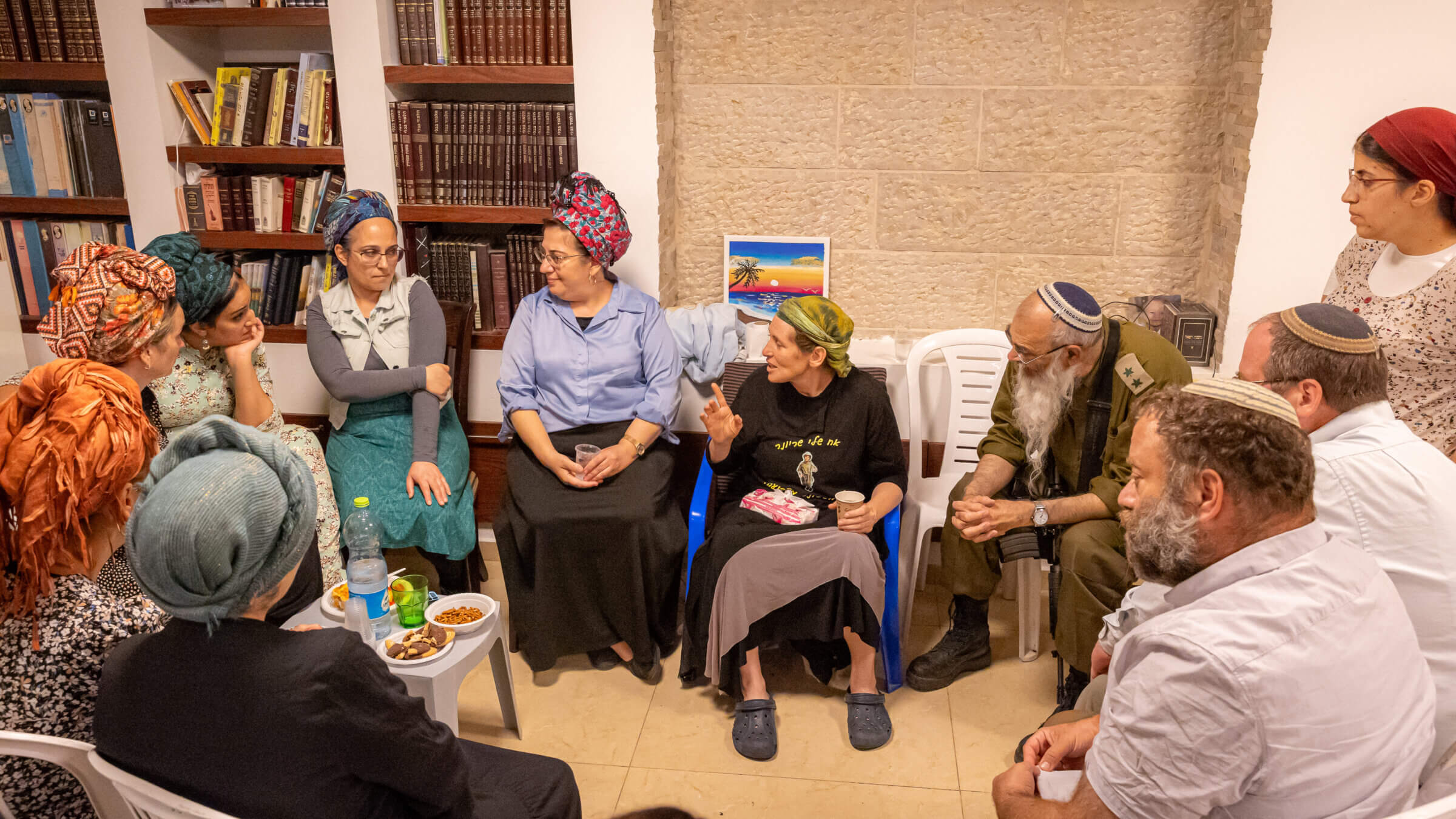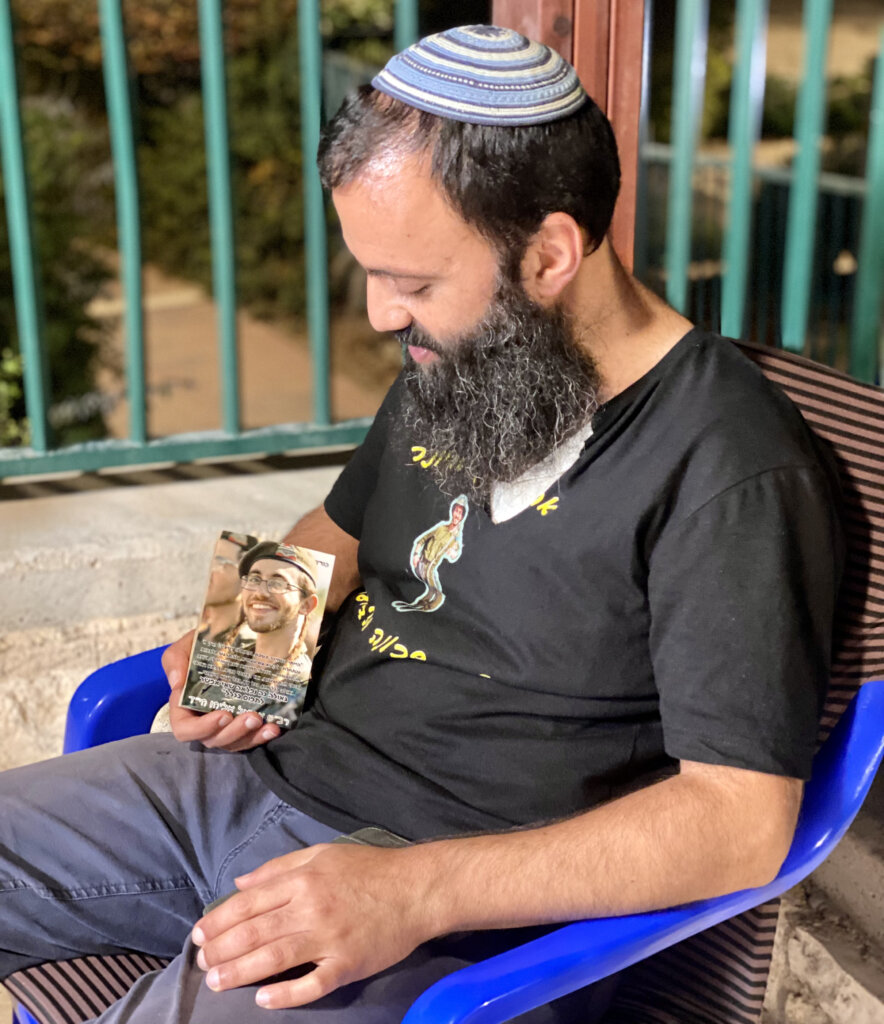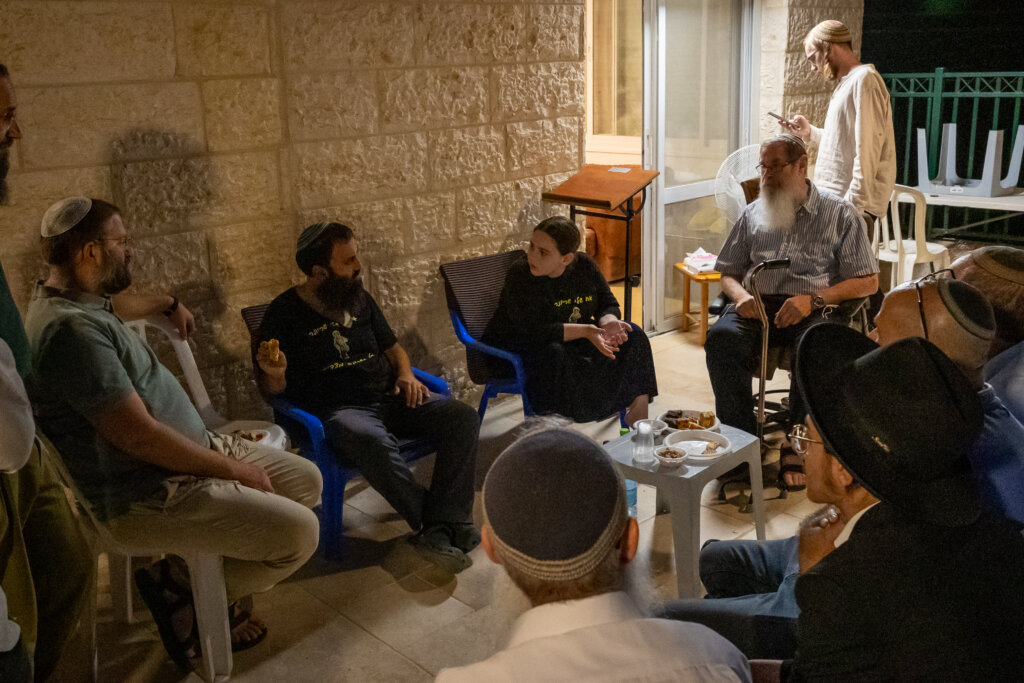‘He lived such a full life’: In a city on a hilltop, a family mourns its oldest son
Mitzpe Yericho, a settlement outside of Jerusalem, grieves a 19-year-old who loved music and Torah

Residents of Mitzpe Yericho gather in the home of Rabbi Achiya and Idit Eliyahu (in the green headscarf), who are sitting shiva following the death of their 19 year-old son, Ariel. Photo by Laura Ben-David
“Tell me about your son,” I said to Rabbi Achiya Eliyahu Wednesday as the sun set over his balcony.
The thrum of dozens of visitors echoed from the living room inside. Rabbi Eliyahu wore a black T-shirt with the smiling face of a young man wearing army fatigues. “Our brother is in the tanks unit,” it proclaims in bright yellow Hebrew text. “The whole community salutes him!”
The face on the T-shirt belonged to Ariel, the oldest of the rabbi’s seven children, who spent most of his life here in Mitzpe Yericho, an Israeli settlement in the occupied West Bank. Ariel was 19 and on active duty in the Israel Defense Forces 7th Armored Brigade when he was killed fighting Hamas during the first days of the war. The crowd in the living room was here to comfort the mourners, one of an untold number of families sitting shiva across Israel as the death toll passes 1,200.
“He was sweet,” Rabbi Eliyahu told me. “Unique. And smart. And he loved to learn Torah. He loved Hashem.”

Then a Red Alert was issued by the government, setting off a cascade of smartphone alerts throughout the house.
Mitzpe Yericho, a Religious Zionist enclave of 500 families about a 30-minute drive east of Jerusalem, is not usually a place subjected to the sirens that warn Israelis of incoming rockets, mortars and missiles. Though Jericho, a Palestinian city about 10 miles away as the crow flies, is perceived by residents as a real and persistent threat, the last actual emergency was early in the COVID-19 pandemic, when Palestinian teenagers took advantage of a broken security camera to enter the settlement.
Back then, there was much fear and panic during the ensuing lockdown, as the security team watched the infiltrators’ movements through an advanced network of thermal cameras and sensors. In the end, the youths left, only after they managed to smuggle Bamba and Bissli out of the local grocery store.
Now, four days after the worst attack on Israel in half a century, the crowd in the Eliyahu family’s living room was calm — but confused. They had come to comfort the grieving parents of an IDF soldier killed in battle, not to reckon with yet another reality of war.
Like every Israeli household, the Eliyahu family’s modest home includes a safe room, but it was much too small for all the visitors. A mix of women in colorful headscarves, yeshiva boys in their large and colorful knitted kippot, and one rabbinic-looking man sporting both a long white beard and an M4 rifle crowded into the long hallway.
We all tried to decode the cryptic alerts flashing across our smartphones: Was it a cyberattack? Actual rockets? Even the mayor of Mitze Yericho, Aliza Pilichowski, wasn’t quite sure.
After a few minutes, we got the all clear. And the rabbi and I returned to the balcony to discuss his murdered son.
Ariel loved music, especially songs about the land of Israel, just like his father. Like many Orthodox boys, he spent a lot of time learning Torah. But unlike most, he also ran a WhatsApp group to coordinate impromptu jam sessions around one of the many public pianos in Jerusalem.
As a teen, he enrolled in a photography class in Tel Aviv, where he was the only male — and the only religiously observant person. He met his girlfriend, Maayan, through a WhatsApp group called “Good Points,” where Israelis share small moments of day-to-day joy with one another.

Two years ago, Ariel enrolled at Yeshivat HaSedera Yerucham, which is located in the Northern Negev and known for its serious Talmud study. He hoped to draft into the IDF’s Golani Brigade, an infantry unit that played a key role in the founding of the state. He also decided to learn to play the violin, and sent his parents a video of himself performing a few simple songs.
“It was so sweet, so sweet,” his father told me.
But Ariel dislocated his shoulder during Passover, ending his Golani dreams — and his violin career. It was only by this fluke of luck that he ended up in the tank unit, and therefore battling Hamas fighters near Israel’s border with the Gaza Strip this weekend.
The people of Mitze Yericho have a highly organized shift schedule to ensure that the rabbi and his wife, Idit, will have a clean bathroom and kitchen while they sit shiva, Judaism’s seven-day period of intense mourning. The volunteers, a mix of women and girls who rotate every two hours, had strict orders to see that the six surviving Eliyahu children were well fed.
Ariel “did so many things in his life,” his father told me. “It’s sad to know that most of these things will not exist anymore.”
“At the same time,” he added, “I feel grateful to Hashem that he lived his life in the way that he lived it — he had such a full way of living a life of Torah.”















